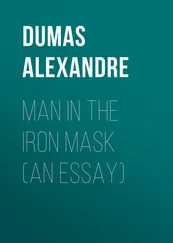George Dover - The True History of the State Prisoner, commonly called the Iron Mask
Здесь есть возможность читать онлайн «George Dover - The True History of the State Prisoner, commonly called the Iron Mask» — ознакомительный отрывок электронной книги совершенно бесплатно, а после прочтения отрывка купить полную версию. В некоторых случаях можно слушать аудио, скачать через торрент в формате fb2 и присутствует краткое содержание. Жанр: foreign_antique, foreign_prose, на английском языке. Описание произведения, (предисловие) а так же отзывы посетителей доступны на портале библиотеки ЛибКат.
- Название:The True History of the State Prisoner, commonly called the Iron Mask
- Автор:
- Жанр:
- Год:неизвестен
- ISBN:нет данных
- Рейтинг книги:5 / 5. Голосов: 1
-
Избранное:Добавить в избранное
- Отзывы:
-
Ваша оценка:
- 100
- 1
- 2
- 3
- 4
- 5
The True History of the State Prisoner, commonly called the Iron Mask: краткое содержание, описание и аннотация
Предлагаем к чтению аннотацию, описание, краткое содержание или предисловие (зависит от того, что написал сам автор книги «The True History of the State Prisoner, commonly called the Iron Mask»). Если вы не нашли необходимую информацию о книге — напишите в комментариях, мы постараемся отыскать её.
The True History of the State Prisoner, commonly called the Iron Mask — читать онлайн ознакомительный отрывок
Ниже представлен текст книги, разбитый по страницам. Система сохранения места последней прочитанной страницы, позволяет с удобством читать онлайн бесплатно книгу «The True History of the State Prisoner, commonly called the Iron Mask», без необходимости каждый раз заново искать на чём Вы остановились. Поставьте закладку, и сможете в любой момент перейти на страницу, на которой закончили чтение.
Интервал:
Закладка:
The desired channel of communication Estrades thought he had found in Matthioli, who was a complete master of Italian politicks, as well as much in the Duke’s good graces. Before, however, he proceeded to enlist him in his service, he deemed it necessary to discover what was the bent of his inclinations. This he effected ingeniously enough, by sending a certain Giuliani, in whom he appears to have placed implicit confidence, to Verona, where Matthioli then was, to act as a spy upon him. The report of Giuliani, upon his return to Venice, was so favourable, both with regard to the discontent of Matthioli against the Spaniards, “who had always amused him with hopes, and afterwards abandoned him,” 11and his wish to enter into the service of the French Monarch, that Estrades lost no time in sending him (Giuliani) back again for the purpose of conferring with Matthioli upon the subject of the proposed negociation.
Giuliani was instructed by the Ambassador to enlarge to Matthioli upon the jeopardy which the sovereignty of the Duke of Mantua was in, in consequence of the different pretensions of various branches of his family to his territories, which were more or less countenanced by the Spaniards for the purposes of their own aggrandizement. These were, among others, those of the Empress Eleanor 12to the Montferrat; and those of the Marquis of Laguna 13to the Duchy of Guastalla, to the prejudice of the Duke of Mantua, who was the rightful heir. Giuliani was also to lament the dependant state of the Duke of Mantua, the revenues of whose states, as well as all the powers of government, were entirely in the hands of his mother, and the Monk Bulgarini; 14and to explain the necessity which, on these accounts, existed for that Prince to seek, without delay, the alliance and protection of Lewis the Fourteenth. He was to assure him, in conclusion, that Estrades had no doubt of the readiness of Lewis to assist in freeing the Duke of Mantua from his embarrassments; but that, in order to enable him to do this effectually, it was absolutely necessary to garrison Casale with French troops.
Matthioli concurred entirely in these views of Giuliani, and offered to sound the Duke of Mantua upon the subject. A few days afterwards, he sent word to Estrades, that he had managed to have an interview with that Prince (having previously established himself secretly in the neighbourhood of Mantua), and had found him generally well-disposed to the plan. He also requested Estrades to send Giuliani again to him, in order that they might act in concert; the said Giuliani being also a person who might, without suspicion, carry intelligence backwards and forwards, 15which was not the case with Matthioli himself.
Giuliani was accordingly sent, and had an audience of the Duke of Mantua, who received him very favourably, and acquainted him with his willingness to enter into an alliance with France, and to deliver up Casale, upon the understanding that Estrades was to try to obtain for him any reasonable requests he might make; the principal of these, in addition to the grant of a sum of money, was the being made generalissimo of any French army that might be sent into Italy, “that being,” says Estrades, “what he wishes beyond all things; or rather, that being the only thing he is very anxious for, in order that he may have the same consideration in Italy the late Duke of Modena 16had, and the late Duke of Mantua, 17who at his age commanded in chief the Emperor’s army, with the title of Vicar General of the Empire.” 18
The Duke of Mantua also announced in this conference, that he put himself, on this occasion, entirely into the hands of Matthioli, whom he promised to reinstate in his place of Secretary of State, and to appoint his first minister, as soon as he himself should have regained his authority, and that the treaty, he was now projecting with the King of France, had been duly executed.
To Matthioli were joined in the negociation the two counsellors of the Duke of Mantua, in whom he had the most confidence; the Marquis Cavriani and Joseph Varano; and these, together with Giuliani, Estrades, Pinchesne the French Secretary of Embassy at Venice, and the Duke himself, were the only persons in Italy acquainted with the business; so that the Ambassador had certainly very fair grounds for expressing his hopes “the secrecy, so necessary in this affair, would remain impenetrable.” 19
This conference was followed by another, in which the Duke showed the greatest impatience to conclude the treaty; entreating that Lewis might be instantly made acquainted with the state it was at present in, and requesting, or rather imploring, for a French army; on the arrival of which he hinted much might be done against the Duchy of Milan. Finally, he promised to have a conference with Estrades, “as he was soon going to Venice, where they might see one another conveniently, and without being observed, on account of the Carnival, during which all the world, even the Doge and the oldest Senators were accustomed to go about in mask.” 20
He also requested that the Cardinal d’Estrées 21might not be made a party to the negociation; because he was so well known to be employed generally by Lewis to negociate with the Italian Sovereigns, that his entering into it would naturally excite the suspicions of the Spaniards that something secret was going on; and that they would then ruin him, the Duke of Mantua, before he could receive the assistance of the French Monarch; and that thus the hopes of both the contracting parties, from the treaty at present under discussion, would be frustrated. To this proposition Estrades agreed, though unwillingly. We cannot but here remark how skilful a negociator he seems to have been; beginning as he does by making trial of his tools, and then of his arguments, and afterwards bringing both of them to bear very judiciously on the negociation, in the way the most likely to lead to a favourable result.
When the affair was advanced thus far, Estrades lost no time in forwarding an account of it to Lewis, to whom, as he says himself, he had not before ventured to write upon the subject, because at first he despaired of being able to bring the intrigue to bear: but he now thought it in so good a train, that upon receiving the approval of his proceedings from Lewis, he could almost answer for its success. The letter of Estrades was accompanied by a schedule, containing the demands of the Duke of Mantua, and by a letter from Matthioli, also addressed to Lewis, in which he offers to devote himself to his service, to strive to detach his master, the Duke of Mantua, from the Austrian interest, and insinuates very plainly his wish and intention of selling him and his fortress of Casale to the French Monarch; whom, he says, he “regards and reveres as a Demigod .” 22To these protestations Lewis returned, as was natural, a very civil answer; 23generally promising his protection and favour to Matthioli.
On the 24th of December of the same year, Estrades 24writes to M. de Pomponne, 25(then one of the Secretaries of State), to inform him of a discovery he has made from the Duke of Mantua himself, that the Austrian party have determined, in case any French troops should arrive in Italy, and that the Duke of Mantua should manifest any disposition of favouring them, to seize upon Casale and Mantua. He therefore adds that the Duke, though thoroughly well-disposed towards the French interests, cannot take any active part in their favour, unless Lewis will send into Italy a sufficient force to secure Casale and the rest of the Duke’s territories from the attempts of the House of Austria. He subsequently seems to hint his fear that the life of the Duke of Mantua may be made away with by the Austrians, in order the more easily to possess themselves of his territories. “We must besides, Sir, consider that the Duke of Guastalla 26being the nearest relation of the Duke of Mantua, as well as his heir, there would be danger that, if the Duchess, 27his daughter, who is very ill and has no children, should die, some misfortune might happen to the Duke of Mantua, which would assure his territories to the Spanish Nobleman, who has married the second daughter 28of the Duke of Guastalla, and whose marriage the Spaniards, doubtless with this view , made up at Vienna by means of Don Vincent.” 29
Читать дальшеИнтервал:
Закладка:
Похожие книги на «The True History of the State Prisoner, commonly called the Iron Mask»
Представляем Вашему вниманию похожие книги на «The True History of the State Prisoner, commonly called the Iron Mask» списком для выбора. Мы отобрали схожую по названию и смыслу литературу в надежде предоставить читателям больше вариантов отыскать новые, интересные, ещё непрочитанные произведения.
Обсуждение, отзывы о книге «The True History of the State Prisoner, commonly called the Iron Mask» и просто собственные мнения читателей. Оставьте ваши комментарии, напишите, что Вы думаете о произведении, его смысле или главных героях. Укажите что конкретно понравилось, а что нет, и почему Вы так считаете.












